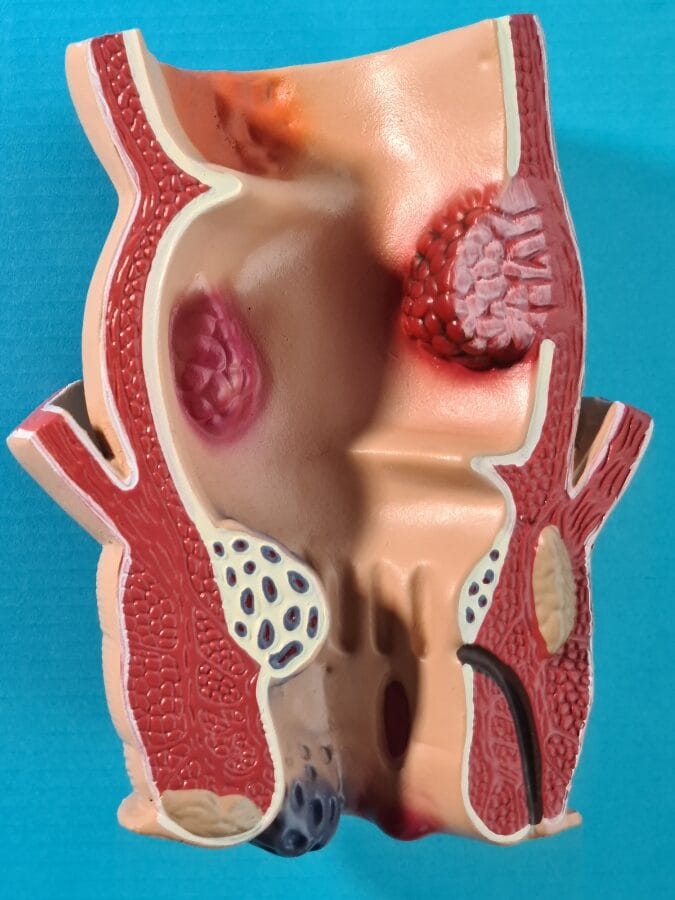You might feel embarrassed to talk about anal discomfort or symptoms, but it’s important to speak up, especially if you’re experiencing pain, itching, or bleeding. These symptoms are often signs of common anal disorders, which range from mild to serious but are all treatable when properly diagnosed.
Common Anal Disorders
Problems with the anus are more common than you might think. Here are some of the most frequent conditions:

- Hemorrhoids: Swollen veins in the anus or lower rectum that may cause bleeding or discomfort during bowel movements.
- Abscesses and Pilonidal Disease: Infections that cause painful swelling or pus-filled lumps, often near the tailbone or anus.
- Anal Fissures: Small cracks or tears in the lining of the anus, usually caused by hard stools or straining. These can feel like sharp pain or a sensation of “sitting on glass.”
- Anorectal Fistula: An abnormal tunnel between the anus or rectum and the skin around it, often resulting from abscesses. Fistulas can cause intense throbbing pain and discharge.
- Pruritus Ani (Anal Itching): Chronic itching around the anus, sometimes caused by irritation, infections, or skin conditions.
- Anal Cancer: A less common but serious condition often caused by persistent HPV infection. Anal cancer is biologically distinct from colorectal cancer and usually presents as a squamous cell carcinoma.
Understanding Anal Cancer
Unlike colorectal cancer, which is typically an adenocarcinoma, anal cancer is most often linked to Human Papillomavirus (HPV). Many symptoms, such as bleeding, lumps, or a change in bowel habits, can be mistaken for hemorrhoids or fissures, leading to delays in diagnosis.
Key Symptoms to Watch For:
- Bleeding or unusual discharge
- Persistent pain during or after bowel movements
- Fecal incontinence
- Itching or irritation
- Lumps or masses
- Changes in bowel habits
Early diagnosis is key, especially since HPV-related dysplasia can develop into cancer over time.

Who Is at Greater Risk?
Certain people may be more susceptible to anal disorders due to lifestyle, genetics, or body characteristics:

- Individuals with chronic constipation or frequent diarrhea, which can strain the anal area.
- People who sit for long periods (e.g., drivers, office workers).
- Obese individuals, due to increased pressure on the pelvic floor.
- Those with a family history of colorectal or anal conditions.
- People with weakened immune systems, including those with HIV.
- Individuals who engage in receptive anal intercourse.
- Smokers, who have a higher risk of anal cancer.
- Unvaccinated individuals exposed to HPV
Diagnosis
Diagnosing anal disorders involves a combination of:
- Visual inspection
- Digital Rectal Exam (DRE)
- Anoscopy
- Flexible sigmoidoscopy or colonoscopy, for deeper internal examination
- MRI or CT scans, especially for fistulas or suspected cancer
- Biopsy, if cancer or dysplasia is suspected
Prompt medical attention can help determine the exact cause of your symptoms and rule out serious conditions.
Prevention Tips
While not all anal disorders can be prevented, these steps can significantly reduce your risk:
✔️ Get the HPV vaccine – it’s the most effective way to prevent anal cancer linked to HPV
✔️ Practice safe sex, including the use of protection and regular STI screening
✔️ Maintain good anal hygiene
✔️ Avoid straining during bowel movements – eat a fiber-rich diet and stay hydrated
✔️ Quit smoking – this lowers your risk of multiple cancers, including anal

Need Help? We’re Here for You
Anal health issues can feel isolating, but you don’t have to go through it alone. Ambulance International Scarborough can help you connect with top specialists in Austria, where experts in proctology, gastroenterology, and oncology can assist in pinpointing the cause of your symptoms and guide you toward the best treatment options.
Get in touch with us by email to get the support you need from professionals who understand and care. Your health and peace of mind are worth it.

